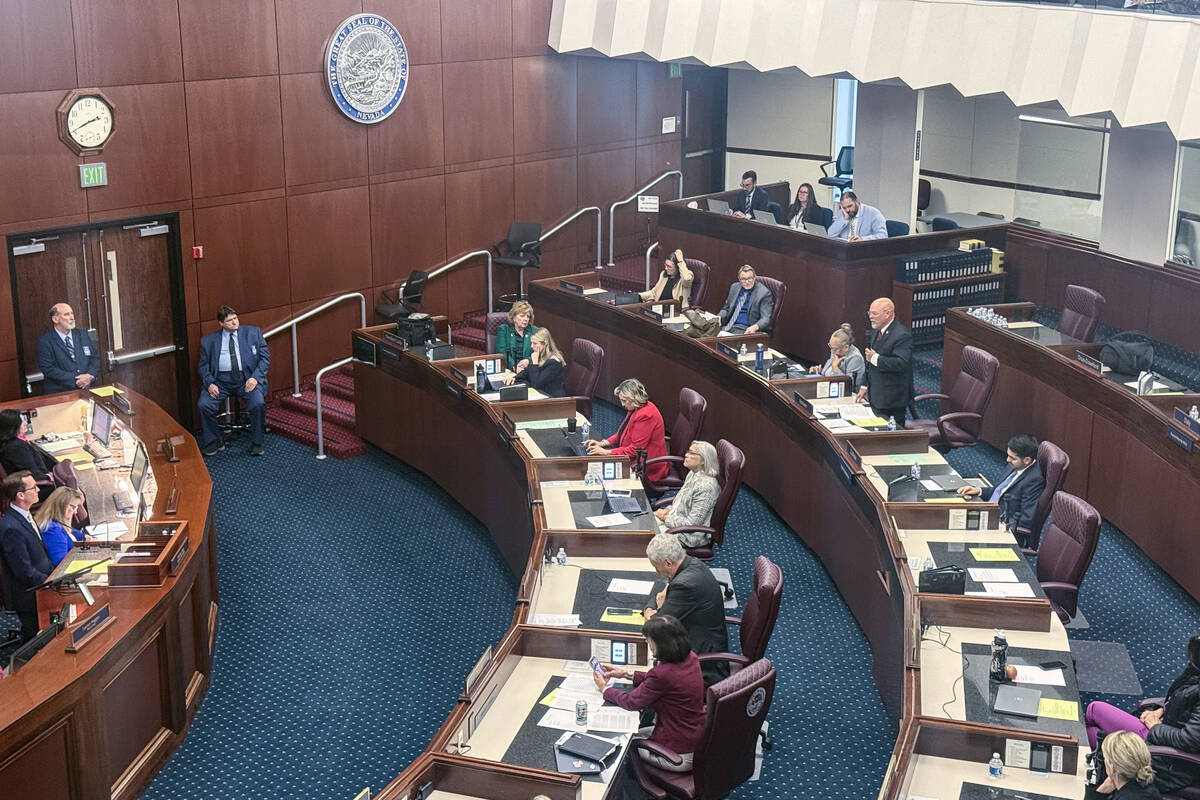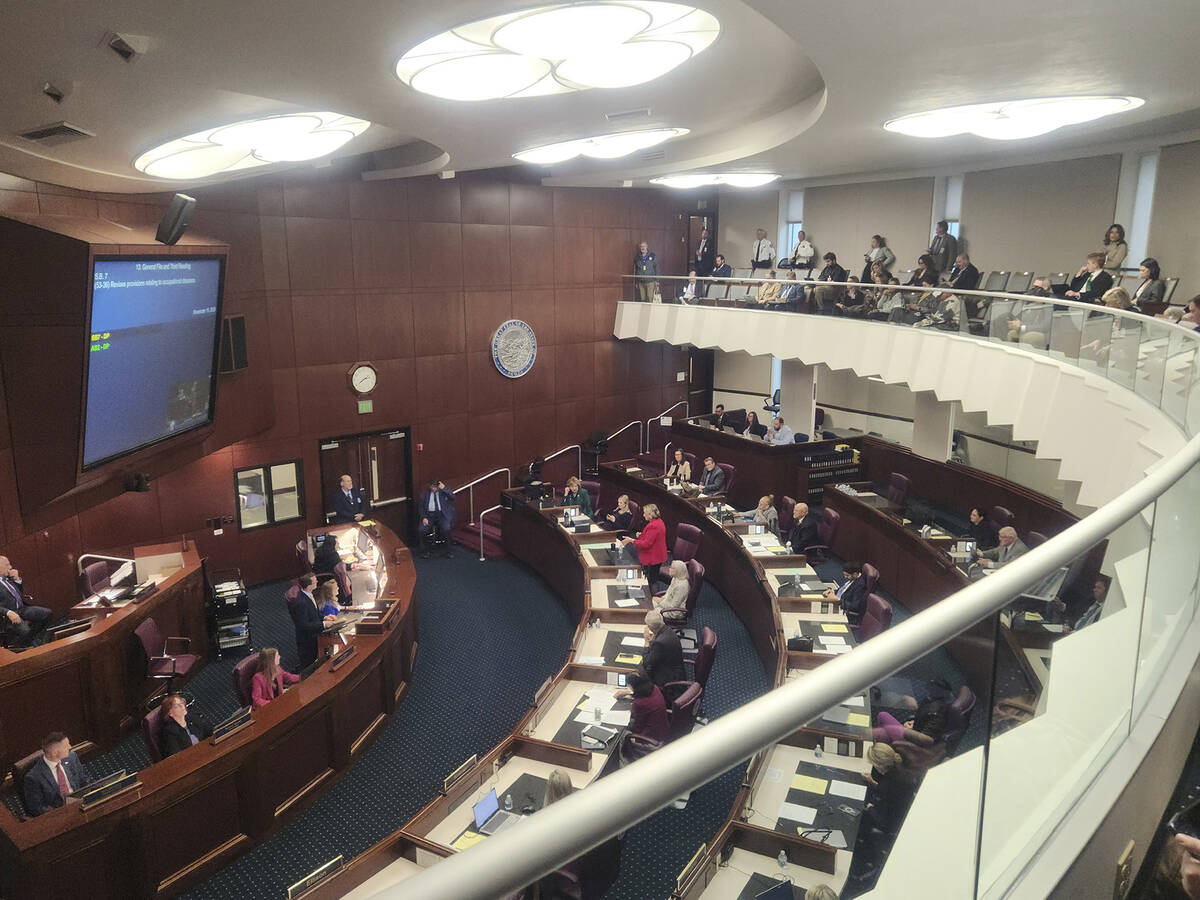Special session ends with passage of last-minute mail-in ballot resolution
CARSON CITY — Rapid-fire votes at the end of the Nevada Legislature’s special session Wednesday ended a controversial effort to build film studios and advanced a resolution for voters to amend the state Constitution, enshrining the right to mail-in ballots.
The film tax credit bill, meant to lure Hollywood to Southern Nevada, did not get a constitutional majority vote in the Senate on Wednesday night. Both Democrats and Republicans voted against the legislation, which narrowly failed a 10-8 vote. Three senators were absent.
Immediately after the failed film bill vote, senators moved to a last-minute measure to ask voters in 2028 to enshrine the right to vote by mail in the Nevada Constitution. The Assembly quickly met again to also pass the resolution with a 26-9 vote, when seven assemblymembers were absent.
The resolution still needs to be considered in the 2027 regular session before it can be put on the ballot in the 2028 general election.
Senate Majority Leader Nicole Cannizzaro, D-Las Vegas, said that lawmakers had the resolution “ready to go” after other measures were resolved. Resolutions, unlike bills, do not require committee hearings and do not have to be approved by the governor.
“One of the ways that we can ensure access to fair and safe elections is to make sure everyone has a chance to vote,” she said after the session ended.
Gov. Joe Lombardo called lawmakers back to Carson City to address an expansive list of legislation he said could not wait for the next regular session in 2027. The session ended Wednesday night after seven days.
“Nevadans deserve action now — not years from now — on issues that most impact their daily lives,” he said in an emailed statement.
Corporate housing legislation fails
Another piece of legislation was introduced and killed on Wednesday. Senate Bill 10 would have regulated corporations’ ability to buy up homes in the state. It would have limited the number of existing houses all corporate investors could purchase each year.
The measure failed in an Assembly vote of 27-10 on Wednesday night. Five assemblymembers were absent for that vote, and the bill needed 28 votes to pass.
The legislation was only considered after two Republican lawmakers crossed party lines to update the special session’s agenda, drawing a rebuke from caucus colleagues.
One of those lawmakers, Assemblymember Alexis Hansen, ultimately voted against the legislation in the Assembly. Her husband, Sen. Ira Hansen, was the deciding factor in the Senate that allowed for the measure to be considered.
Alexis Hansen was emotional Wednesday night when she addressed the Assembly. The Sparks Republican said she wanted the bill to be considered, but lawmakers did not solve what she said were issues in the bill.
“I never committed my vote,” she said. “I was hoping for the best and that has not transpired.”
The measure was a revived bill stemming from legislation that failed in the regular session. The bill initially capped the number of homes corporations could purchase at 100, but an amendment added Wednesday would have raised the limit to 1,000 houses among all corporate buyers.
Earlier in the day, the Senate passed the bill 18-0, with three lawmakers excused absent.
There were several exceptions to the bill, including an exception that did not cap the purchases of newly built houses.
Decorum up for debate
The day before the special session ended saw little public-facing activity until Ira and Alexis Hansen joined the Democratic legislators in signing the petition to alter the session’s agenda.
The petition was read into the Senate record Wednesday morning. One Republican senator told the floor that she thought her caucus was left in the dark.
“I have to say I find it reprehensible that my colleague from Senate District 14 (Hansen) —that he has refused to share the language for this housing bill with his own caucus. I find it very unprofessional, and it just makes me wonder and beg the question, why? Why would you, a member of our own caucus, not want to work with us?” Sen. Lori Rogich, R-Las Vegas, said.
Her comments sparked a 20-minute floor debate about the timing of the bill’s drafting and decorum in the Senate.
“For the first time in Nevada history, the Legislature is acknowledging that we are a co-equal branch of government that can make our own decisions for the people that have elected us,” Sen. Majority Leader Nicole Cannizzaro, D-Las Vegas, said on the floor. “And this is absolutely a crisis that we have to address.”
The legislation came from Senate Bill 391, which failed in the regular session. A previous version of the bill was vetoed by Lombardo in 2023.
Proponents have said the bill was meant to help first time home buyers compete with corporate owners. Opponents raised concerns that the bill could have affected the supply of rental homes in the state.
During a committee meeting Wednesday morning, Sen. Dina Neal, who championed the proposal in recent sessions, said the measure was separate from other major legislation that was up for debate.
“As I stated on the Senate floor, I am not horse trading for corporate investors for a vote on film,” Neal, D-North Las Vegas, said. “They are two separate activities. It is not an activity that I said to my colleague right here, ‘please do this so I can feel comfortable to vote on film.’”
Governor’s crime bill passes — with amendments
An early morning Wednesday session passed a notable measure to alter portions of the state’s criminal justice laws.
State senators amended and passed Lombardo’s wide-sweeping crime bill — Assembly Bill 4 — during a floor session that began just after 12:30 a.m. Wednesday. The amendment added sections requiring detention facilities to maintain a list of each person held at the facility, and would prohibit U.S. Immigration and Customs Enforcement officials from entering schools without a warrant.
The Republican governor vetoed a bill limiting ICE in schools that passed during the regular session.
Senators asked for the bill back on Wednesday to add another amendment clarifying that local and state law enforcement would not be banned from schools due to the legislation. The amendment passed both the Senate and Assembly on Wednesday night, sending the legislation to the governor.
Bills that passed both houses include changes to traffic penalties in school safety zones; investments in the state’s cybersecurity infrastructure; the establishment of a state public assistance program based on the Supplemental Nutrition Assistance Program and others like it; and additional funding for the relocation of households in the Windsor Park neighborhood of North Las Vegas, among other measures.
Contact McKenna Ross at mross@reviewjournal.com. Follow @mckenna_ross_ on X. Contact Katelyn Newberg at knewberg@reviewjournal.com or 702-383-0240.



















